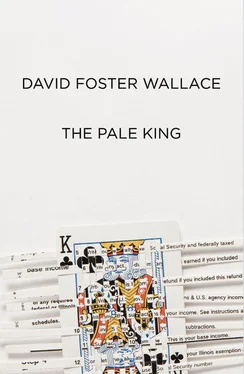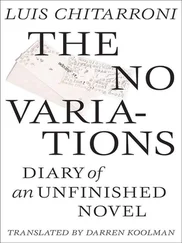David Wallace - The Pale King - An Unfinished Novel
Здесь есть возможность читать онлайн «David Wallace - The Pale King - An Unfinished Novel» весь текст электронной книги совершенно бесплатно (целиком полную версию без сокращений). В некоторых случаях можно слушать аудио, скачать через торрент в формате fb2 и присутствует краткое содержание. Год выпуска: 2011, Издательство: Little, Brown & Company, Жанр: Современная проза, на английском языке. Описание произведения, (предисловие) а так же отзывы посетителей доступны на портале библиотеки ЛибКат.
- Название:The Pale King: An Unfinished Novel
- Автор:
- Издательство:Little, Brown & Company
- Жанр:
- Год:2011
- ISBN:нет данных
- Рейтинг книги:3 / 5. Голосов: 1
-
Избранное:Добавить в избранное
- Отзывы:
-
Ваша оценка:
- 60
- 1
- 2
- 3
- 4
- 5
The Pale King: An Unfinished Novel: краткое содержание, описание и аннотация
Предлагаем к чтению аннотацию, описание, краткое содержание или предисловие (зависит от того, что написал сам автор книги «The Pale King: An Unfinished Novel»). Если вы не нашли необходимую информацию о книге — напишите в комментариях, мы постараемся отыскать её.
The Pale King
The Pale King: An Unfinished Novel — читать онлайн бесплатно полную книгу (весь текст) целиком
Ниже представлен текст книги, разбитый по страницам. Система сохранения места последней прочитанной страницы, позволяет с удобством читать онлайн бесплатно книгу «The Pale King: An Unfinished Novel», без необходимости каждый раз заново искать на чём Вы остановились. Поставьте закладку, и сможете в любой момент перейти на страницу, на которой закончили чтение.
Интервал:
Закладка:
And nor was it just good or pleasurable things you were aware of, on Obetrol or Cylert. Some of the stuff it brought into awareness wasn’t pleasant, it was just reality. Like sitting in the UIC dorm room’s little living room and listening to the roommate-slash-social-rebel from Naperville in his bedroom talking on his phone — this so-called nonconformist had his own phone line, paid for by guess who — talking to some coed, which if there was no music or TV on, you couldn’t help overhearing through the walls, which were notoriously easy to put your fist through if you were the type that punched walls, and listening to his rap of ingratiating patter to this coed, and not only sort of disliking him and feeling embarrassed for him at the affected way he talked to girls — as if anybody who was paying any attention could miss seeing how hard he was trying to project this idea of himself as hip and radical without being the slightest bit aware of how it really looked, which was spoiled, insecure, and vain — and listening and feeling all this, but also being uncomfortably aware that I was, meaning having to consciously feel and be aware of these inner reactions instead of just having them operate in me without quite admitting them to myself. I don’t think I’m explaining it very well. Like having to be able to say to yourself, ‘I am pretending to sit here reading Albert Camus’s The Fall for the Literature of Alienation midterm, but actually I’m really concentrating on listening to Steve try to impress this girl over the phone, and I am feeling embarrassment and contempt for him, and am thinking he’s a poser, and at the same time I am also uncomfortably aware of times that I’ve also tried to project the idea of myself as hip and cynical so as to impress someone, meaning that not only do I sort of dislike Steve, which in all honesty I do, but part of the reason I dislike him is that when I listen to him on the phone it makes me see similarities and realize things about myself that embarrass me, but I don’t know how to quit doing them — like, if I quit trying to seem nihilistic, even just to myself, then what would happen, what would I be like? And will I even remember this when I’m not Obetrolling, or will I just go back to being irritated by Steve Edwards without quite letting myself be aware of it, or why?’ Does this make sense? It could be frightening, because I would see all this with uncomfortable clarity, although I would not have used a word like nihilism during that period without trying to make it sound cool or like an allusion, which to myself, in the clarity of doubling, I wouldn’t have been tempted to do, as I did things like this only when I wasn’t really aware of what I was doing or what my real agenda was, but rather on some kind of strange, robotic autopilot. Which, when I did Obetrol — or once, at DePaul, a variant called Cylert, which only came in 10 mg. tablets, and was only available one time in a very special situation that never repeated — I tended to realize again that I wasn’t even really aware of what was going on, most of the time. Like taking the train instead of actually driving yourself somewhere and having to know where you were and make decisions about where to turn. On the train, one can simply space out and ride along, which is what it felt as though I was doing most of the time. And I’d be aware of this too, on these stimulants, and aware of the fact that I was aware. The awarenesses were fleeting, though, and after I came off of the Obetrol — which usually involved a bad headache — afterward, it felt as though I barely remembered any of the things I’d become aware of. The memory of the feeling of suddenly coming awake and being aware felt vague and diffuse, like something you think you see at the outer periphery of your vision but then can’t see when you try to look directly at it. Or like a fragment of memory which you’re not sure whether it was real or part of a dream. Just as I’d predicted and been afraid of when I’d been doubled, of course. So it wasn’t all fun and games, which was one reason why Obetrolling felt true and important instead of just goofy and pleasurable like pot. Some of it was uncomfortably vivid. As in not merely waking up to an awareness of my dislike of the roommate and his denim workshirts and guitar and all of the so-called friends who came around and had to pretend to like him and find him cool in order to get their gram of hash from him or whatever, and not just disliking the whole rooming situation and even the nihilistic ritual of the foot and the Hat, which we pretended was a lot cooler and funnier than it was — as it wasn’t as though we did it just once or twice but basically all the time, it was really just an excuse not to study or do our work and instead be wastoids while our parents paid our tuition, room, and board — but also being aware, when I really looked at it, that part of me had chosen to room with Steve Edwards because part of me actually sort of enjoyed disliking him and cataloguing things about him that were hypocritical and made me feel a sort of embarrassed distaste, and that there must be certain psychological reasons why I lived, ate, partied, and hung around with a person I didn’t even really like or respect very much… which probably meant that I didn’t respect myself very much, either, and that was why I was such a conformist. And the point is that, sitting there overhearing Steve tell the girl on the phone that he’d always felt today’s women had to be seen as more than just sex objects if there was going to be any hope for the human race, I would be articulating all this to myself, very clearly and consciously, instead of just drifting around having all these sensations and reactions about him without ever being quite aware of them. So it basically meant waking up to how unaware I normally was, and knowing that I’d be going back to sleep like that when the artificial effect of the speed wore off. Meaning it wasn’t all fun and games. But it did feel alive, and that’s probably why I liked it. It felt like I actually owned myself. Instead of renting or whatever — I don’t know. But that analogy sounds too cheap, like a cheap witticism. It’s hard to explain, and this is probably more time than I should take to explain it. Nor am I obviously trying to give any pro-drug-abuse message here. But it was important. I like now to think of the Obetrol and other subtypes of speed as more of a kind of signpost or directional sign, pointing to what might be possible if I could become more aware and alive in daily life. In this sense, I think that abusing these drugs was a valuable experience for me, as I was basically so feckless and unfocused during this period that I needed a very clear, blunt type of hint that there was much more to being an alive, responsible, autonomous adult than I had any idea of at the time.
On the other hand, it goes without saying the key is moderation. You couldn’t spend all your time taking Obetrols and sitting there doubled and aware and still expect to take care of business effectively. I remember not getting Camus’s The Fall read in time, for instance, and having to totally bullshit my way through the Literature of Alienation midterm — in other words, I was cheating, at least by implication — but not feeling much about it one way or the other, that I can recall, except a sort of cynical, disgusted relief when the prof’s grader wrote something like ‘Interesting in places!’ under the B. Meaning a meaningless bullshit response to meaningless bullshit. But there was no denying it was powerful — the feeling that everything important was right there and I could sometimes wake up almost in mid-stride, in the middle of all the meaningless bullshit, and suddenly be aware of it. It’s hard to explain. The truth is that I think the Obetrol and doubling was my first glimmer of the sort of impetus that I believe helped lead me into the Service and the special problems and priorities here at the Regional Examination Center. It had something to do with paying attention and the ability to choose what I paid attention to, and to be aware of that choice, the fact that it’s a choice. I’m not the smartest person, but even during that whole pathetic, directionless period, I think that deep down I knew that there was more to my life and to myself than just the ordinary psychological impulses for pleasure and vanity that I let drive me. That there were depths to me that were not bullshit or childish but profound, and were not abstract but actually much realer than my clothes or self-image, and that blazed in an almost sacred way — I’m being serious; I’m not just trying to make it sound more dramatic than it was — and that these realest, most profound parts of me involved not drives or appetites but simple attention, awareness, if only I could stay awake off speed.
Читать дальшеИнтервал:
Закладка:
Похожие книги на «The Pale King: An Unfinished Novel»
Представляем Вашему вниманию похожие книги на «The Pale King: An Unfinished Novel» списком для выбора. Мы отобрали схожую по названию и смыслу литературу в надежде предоставить читателям больше вариантов отыскать новые, интересные, ещё непрочитанные произведения.
Обсуждение, отзывы о книге «The Pale King: An Unfinished Novel» и просто собственные мнения читателей. Оставьте ваши комментарии, напишите, что Вы думаете о произведении, его смысле или главных героях. Укажите что конкретно понравилось, а что нет, и почему Вы так считаете.












